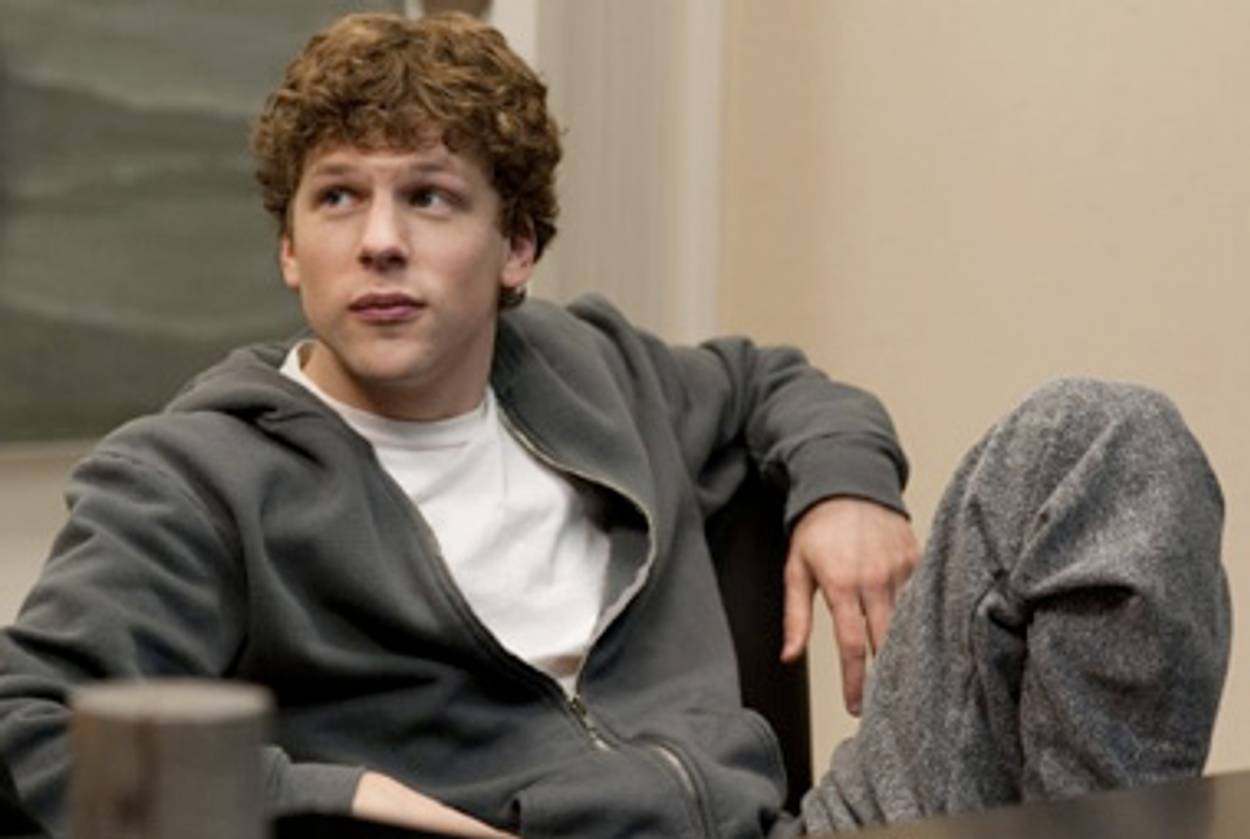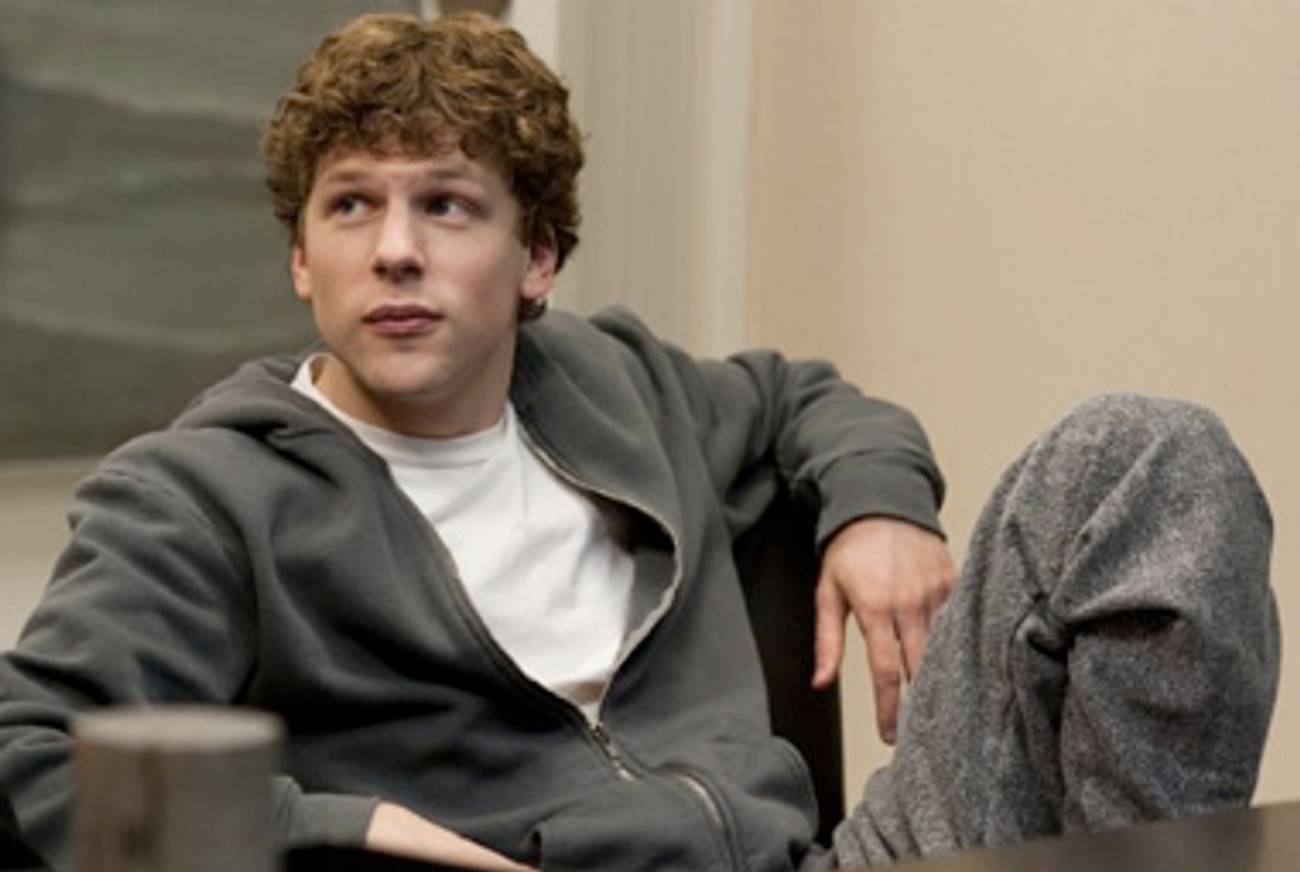The World’s Most Powerful Jew
‘The Social Network’ and the outsider




We were going to end up with something very like Facebook: The Internet and human nature would have conspired to give us the sort of Website for all-purpose social networking—for virtual living?—that Facebook is. Whatever we ended up with may even have been the product of what The Social Network, the fabulous David Fincher-directed, Aaron Sorkin-written film opening wide Friday, says Facebook was: The nuclear-fission force of one young outsider (Mark Zuckerberg) who desired to become the ultimate insider, surmounting all the barricades in front of him while flipping them a parade of birds.
But we actually ended up with Facebook. It is perhaps the dominant Website for the most people on the globe; it boasts 500 million users; the company is probably worth $33 billion. The barricades of privilege that its creator overcame were not run-of-the-mill, but the ultimate: Facebook was not created at a Harvard manqué; it was literally created at Harvard. And the outsider? He is not a random, one-type-out-of-many outsider, but the ultimate type of outsider: He is not a Jew manqué; he is literally a Jew. So is his co-founder (Eduardo Saverin), and one of his two first employees. I can’t prove this isn’t coincidental, but the circumstantial evidence is on my side. Chiefly: We were going to end up with something very like Facebook, but we actually ended up with Facebook, where everyone is the president of their own elite club of one—the Platonic embodiment of the indelibly Jewish alloy of self-hatred and striving.
The Social Network does not need to prove this coincidence: An independent work of creative art, merely based on reality, it is free to impose the Jewish-outsider-takes-on-Harvard narrative, and it does so thrillingly. Zuckerberg, played curly-haired and runt-ish in a hooded sweatshirt by Jesse Eisenberg, is driven by many things—the girlfriend who breaks up with him in the first scene, the excitement of his own genius—but top among them is the slight he feels at having never gained entrée to Harvard’s elite final clubs. (Crucially, Facebook was intially open only to Harvard students, and pretty soon solely to students at elite schools; its present democratic phase is comparatively recent. In the film, Zuckerberg gets off at this exclusivity.)
Zuckerberg can’t stand that Saverin, his best friend, was “punched” by one of the clubs. He can’t stand the Winklevoss twins—the hunky specimens of entrenched WASP masculinity who first approach him with the idea of a Facebook-like site—who, as per house rules, will not admit him past the “bike room” of their club’s house. On the night that he came up with the idea, he and Saverin were attending a supremely tacky Caribbean-themed party at—as he tells the others seated around the table at one of his depositions (both the Winklevosses and Saverin are suing him)—“Alpha Epsilon Pi.” “What’s that?” a lawyer asks. Zuckerberg is almost too mortified to say the words: “A E Pi. It’s the Jewish fraternity.” (Zuckerberg was a member in real life.)
Yet I have to wonder whether The Social Network’s narrative of Jew-against-all is not a bit dated. After all, long gone are the days when Jews were true outsiders at Harvard and (nearly) everywhere else. In 1969, Philip Roth’s Alexander Portnoy could have parents who marveled at their son’s invitation to Gracie Mansion; today, we live in Gracie Mansion (or, rather, we host parties there, and live in a $30 million townhouse in a better neighborhood). One of my favorite lines from my favorite movie, 1978’s Animal House (set in 1962), is: “Bad news: I just checked with the guys at the Jewish house, and they say all our answers to the Psych test were wrong.” Today, you’d make that joke about the Asian house, or the Indian house—the Jewish house is just another house. At Harvard, I can personally attest, there are Jews in even the most elite final clubs. (Myself, I’ve been inside one of them, The Fox, because my oldest friend was a member. I obviously was not allowed upstairs, but I didn’t particularly care.)
One of the best and most telling moments in a movie stuffed with great and telling moments is a line from one of the few characters in the movie older than 22. Saverin notes that, when Facebook launched, Zuckerberg became the Big Man on Campus at a place filled with Nobel Prize winners, Pulitzer Prize winners, a president who had been the Secretary of the Treasury (by the way, the Larry Summers scene is hilarious), and countless other celebrities, including “a movie star.” “Which movie star?” Zuckerberg’s middle-aged lawyer asks with gossip-y curiosity. Zuckerberg and Savarin, by now mortal enemies, nonetheless share the same grimace.
In my personal experience, elite institutions like Harvard have been democratized such that our parents are much more fascinated by the fact that we are friends with a senator’s son or classmates with a movie star than we ourselves are. At Harvard, the final clubs’ upstairs/downstairs dynamic is a relic, and everyone knows it, and so almost nobody cares. (At Columbia, where I matriculated, the closest thing to a final club is St. A’s, which is known mainly for cocaine and the cover of Vampire Weekend’s first album.) So I am tempted to lend greater credence to psychological portraits of Zuckerberg that downplay his Jewish aspect (incidentally, he identifies as an atheist), and the larger “The final club didn’t let me in” story-line (which Zuckerberg explicitly rejects). As I say, I don’t believe Facebook’s overwhelmingly Jewish origins are pure coincidence: There is surely something left over from our ancestors that, like a line of computer code, commands a greater proportion of us to be more boldly innovative than any other people. But I think this explanation can only take us so far.
The lawyer’s question about the Harvard movie star is also, I’m pretty sure, meant as an in-joke: A young attorney taking notes in the deposition room is played by Rashida Jones, a famous actress who graduated in 1997 from, yup, Harvard. In fact, the inaugural cover of 02138, a magazine for Harvard alums, famously declared, over a picture of Jones, “She’s Harvard. So Are You. (Discuss.)” In fact, even as a student Jones was a celebrity, of a sort: Her father is the legendary music producer Quincy Jones.
Of course, her mother is a Jewish woman. She’s Harvard. So’s Zuckerberg. So are many, many other Jews. There is not much else to discuss.
Marc Tracy is a staff writer at The New Republic, and was previously a staff writer at Tablet. He tweets @marcatracy.